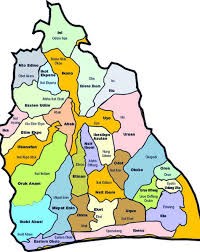At 33: Reflections On Akwa Ibom Dream

In the past years, Akwa Ibom State creation anniversaries were celebrated with pomp but would be markedly different this year as the times rather call for deeper retrospect, soul searching and repositioning of our collective Akwa Ibom dream.
At 33 years Akwa Ibom State seemingly has the economy going for her as the nation’s number one oil producer and revenue earner with the attendant advantages accruing thereof.
Her prosperity today did not simply fall on her laps but is the result of cumulative years of struggles and agitations for political, economic and social justice by our forebears.
As a people blessed in natural and human resources, Akwa Ibom is gradually easing into an era of prosperity which needs to be properly addressed to avoid the pitfalls.
At every point in her history, Akwa Ibom has always had leaders imbued with great vision to leave behind infrastructural development needed for her steady growth.
Interestingly, Akwa Ibom is perhaps one of the few places where continuity in governance has seen a trend where successors have always endeavoured to build on foundations laid by their predecessors and to complete projects left behind.
Irrespective of political differences, the people are burning with a passion passed on to them from their forebears to build the Akwa Ibom Dream.
It would be recalled that the people of the present geographical area called Akwa Ibom, led by the Ibibio State Union in 1928, were the first set of Nigerians to call for statehood. That dream for statehood was passed from generation to generation until it materialized in 1987.
Therefore, the birth of Akwa Ibom as the 21st state of the Nigerian federation was proudly celebrated as the actualization of the Promised Land and greeted with an outpouring of overwhelming affection.
In spite of the national economic vagaries that have caused hardship to many individuals and families in the state, the people are still nurturing their Akwa Ibom Dream.
But what, indeed, is the Akwa Ibom Dream?
It is a set of eternal and surreal visions to see a state that is close to egalitarianism; which every person will be proud of and have the opportunities to achieve prosperity and live in peace in a society where hunger would have been overcome.
Sometimes it may be difficult to fully express in few words the Akwa Ibom Dream but it is the collective and individual yearnings built on faith, determination and hard work.
Today, through visionary leadership and a determined but peaceful people, Akwa Ibom’s profile is on the rise as one of the fastest-growing states in Nigeria. If the pace of development is sustained, Akwa Ibom would sooner become a fledging economic tiger in Nigeria.
READ ALSO: A’Ibom 33rd Anniversary : Gov Emmanuel Leads Citizens In Thanksgiving
Once again we have to take a look at some of the visionary projects by our leaders which have helped to place Akwa Ibom in the echelon of development and to equate with older states.
In fact, Akwa Ibom is turning the tables in Nigeria. Who would have believed today that Akwa Ibom will become Nigeria’s topmost oil revenue earner? It is the reward for the painstaking efforts of our leaders who demanded economic justice.
Who would have believed that Akwa Ibom was the fourth state in Nigeria to have been connected to the global system of communication (GSM) in 2001 many years ahead of older states?
Who would have believed that Akwa Ibom would today be among the four states to have a category two airport alongside Lagos, Abuja and Port Harcourt airports?
Who would have believed that Akwa Ibom is on the verge of getting approval to build the largest seaport in the Gulf of Guinea?
Who would have believed that Akwa Ibom would have the best stadium in Nigeria today?
Who would have believed that Akwa Ibom is now a state with the second-highest foreign investment profile?
But most amazingly, who would have believed that Akwa Ibom will today become the first state in Nigeria to own an airline?
All these feats were driven by the Akwa Ibom Dream and the tables are turning in favour of Akwa Ibom.
However, while we celebrate the gradual realization of the Akwa Ibom Dream we should beware of pitfalls that can derail the vision to cause widespread disaffection.
In fact, the government should ensure that the commonwealth of Akwa Ibom is not left in the hands of a few people at the expense of the majority.
As the state’s prosperity increases, so would everyone monitor how the commonwealth is being distributed.
Equitable distribution of wealth will go a long way in keeping the Akwa Ibom Dream alive.
It is a dream that must be sustained.




